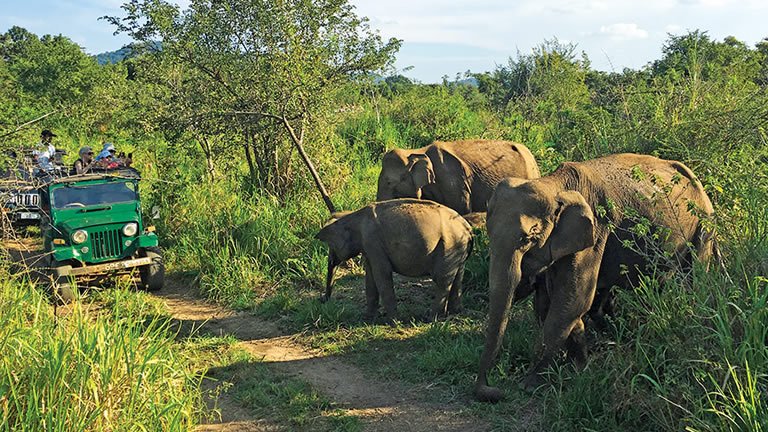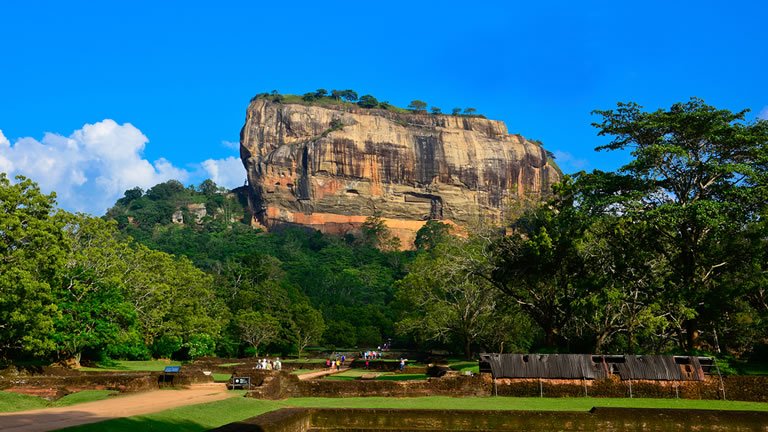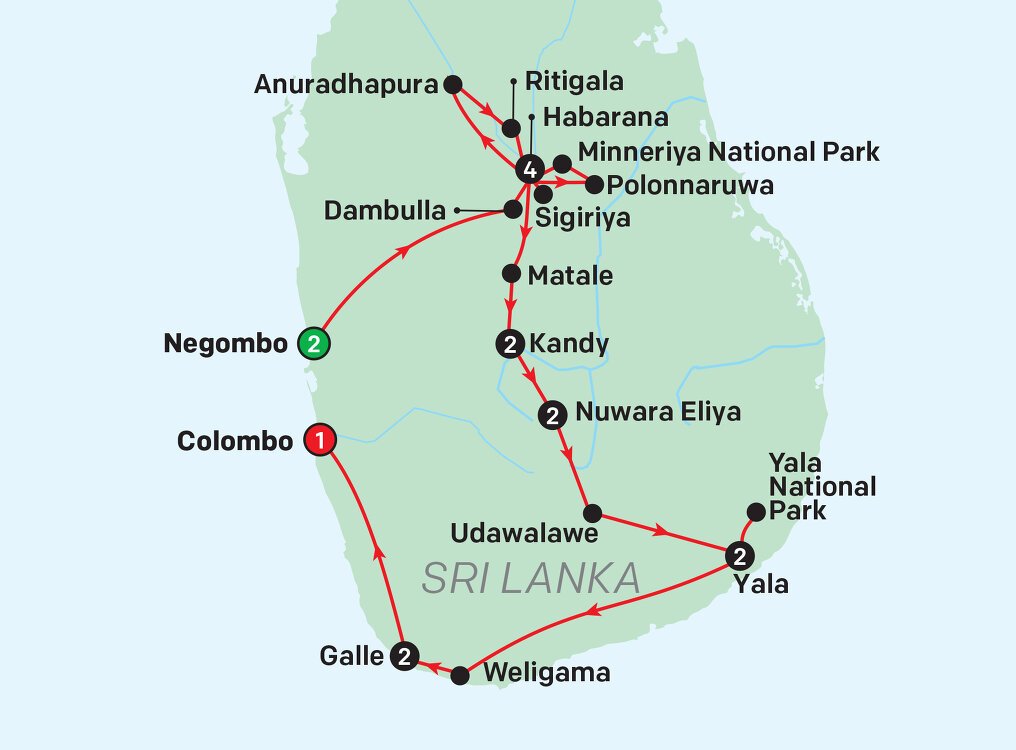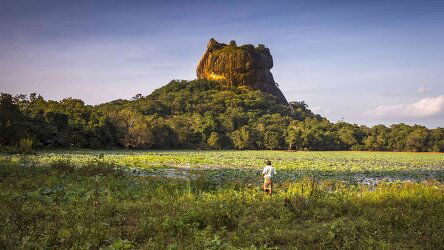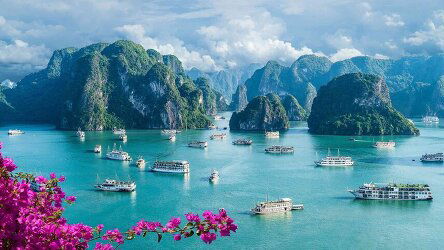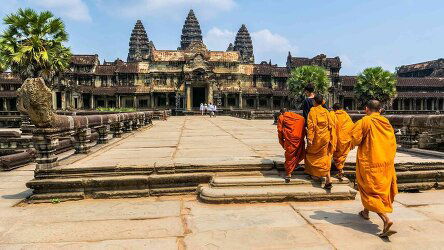Overview
Itinerary
Welcome to Sri Lanka, where the original soul of Buddhism still flourishes, and nature's beauty remains relatively unspoiled. Stunning landscapes, pristine beaches, captivating cultural heritage and wildlife experiences await!
The coastal town of Negombo is set alongside a picturesque lagoon and home to an impressive network of canals built in Dutch colonial times. Negombo was an important strategic outpost for the trade of cinnamon in colonial times and has been ruled at varying times by the Dutch, Portuguese and British empires.
We'll enjoy the day at leisure today to rest up and refresh from yesterday's late night flight before our sightseeing commences in the early evening.
Special Experience: Cruise along the calm waters of the jungle-fringed Negombo Lagoon at sunset before enjoying a delicious BBQ dinner. As the sun sets, keep an eye out for various colourful birds and water monitors while our boat navigates the mangrove islands. In a fitting welcome to our time in Sri Lanka, we'll then be treated to a delicious traditional meal while getting to know our fellow travelling companions further over dinner.
Sri Lanka is home to no less than 8 UNESCO World Heritage-listed sites, 5 of which are situated in what is known as the cultural triangle, in the centre of the island. Neighbouring some of Sri Lanka's most important sites and landmarks, Habarana is the gateway to Sri Lanka's cultural triangle and national parks.
Negombo's fish markets are full of life and colour each morning when the fresh catch is brought in and vendors voice their prices at the top of their lungs. Buyers bargain for the best deals in what is a daily practice for the locals of this coastal town. We'll visit the fish markets during a morning tour of Negombo; don't wear your best shoes and have a handkerchief on hand just in case (it tends to smell rather fishy)!
We'll begin making our way to Habarana stopping en-route in Dambulla, home to the best-preserved cave temple complex of Sri Lanka, a key site of the country's cultural triangle. The cave temples were built in the 1st century and the gigantic granite outcrop towers more than 160 metres above its surrounds. We explore the caves covered by ancient frescoes and their interior where hundreds of statues of Buddha (157 in fact) are housed, some carved from the rock itself.
We continue to Habarana and enjoy the remainder of our afternoon at leisure. Our hotel features a large outdoor pool, ideal for relaxing after a day of sightseeing.
Anuradhapura is one of the ancient capitals of Sri Lanka and the capital of the North Province. This UNESCO World Heritage-listed city is known for its many ruins of temples, ancient pools and dagobas. We'll spend the morning exploring Sri Lanka's largest and oldest ancient city, seeing its famous white dagobas – large bell-like structures that reach some 60 metres in height which house Buddhist relics.
We'll travel back to Habarana via the Ritigala Medicinal Forest. Set deep in the jungle around a large hill formed by huge sculptural granite monoliths, lies the ancient and now abandoned hermitage of Ritigala. Today the visible remains are those of a Buddhist monastic congregation that used to practice meditation in total austerity. Rarely visited by tourists, this mystical place is incredibly beautiful and unspoilt with shady forests filled with streams, pools and granite boulders leading to ruins with various meditation platforms.
Polonnaruwa lies at the cultural triangle's easternmost point and became Sri Lanka's second capital in the 11th century. We'll spend our morning in the ancient city that was built alongside a large artificial lake and is home to well-preserved ruins of palaces, bathing pools, stupas and exquisite rock sculptures of Buddha at the Gal Vihara.
Lunch will be spent dining with the friendly locals as we're welcomed into a family's own backyard.
Our destination this afternoon is Minneriya National Park, where vast expanses of evergreen forest and scrub areas serve as the roaming grounds for elephants and sambar deer. The central feature of the park is the ancient Minneriya Tank, built in the 3rd century by King Mahasena. During the dry season from June to September, this tank is an incredible place to observe the elephants who come to bathe and graze, as well as the huge flocks of birds such as cormorants and painted storks, that come to fish in the shallow waters.
Regarded as one of Sri Lanka's most impressive sites, a visit to the famous rock fortress of Sigiriya is a must. The remains of a 5th-century fortress lie perched high atop a rock plateau, offering panoramic views over a vast plain and dense jungles. Built by King Kasyapa, an impressive 5-acre fort sat astride the rock and a city nestled at its base, but now the city is gone and the fortress is in ruins.
We depart our hotel early this morning to visit Sigiriya. Braving the spiral staircase, we'll see the 21 frescoes of female nature spirits, known as Apsaras, painted beneath an overhang about 90 metres up the rock. These frescoes are beautiful – still boasting vibrant colours even after 1,500 years. Just above them, a wall adorned with 1,000-year-old graffiti and poetry serves as a testament to visitors who recorded their impressions of the painted women. Reaching the summit after climbing 1,200 stairs, we are rewarded with breathtaking views over the Sri Lankan jungle below and intriguing remnants of a once-thriving kingdom.
Special Experience: Visit a local village near Sigiriya and be welcomed into a local home for a traditional lunch. We get acquainted with the traditions of the local family as we watch how they prepare their meals, learn some traditional cooking techniques and enjoy a delicious meal together. After lunch, we'll enjoy the remainder of our afternoon at leisure.
Kandy is a truly charming town, set around an artificial lake and nestled amidst rolling hills covered by forests and tea plantations. Known for housing the most important Buddhist temple in the country, the former capital of Ceylon and the last seat of the Sinhalese Kingdom is Sri Lanka's cultural capital. The city has a distinctive style due to the impressive colonial architecture that still survives today.
En-route to Kandy, we'll stop at the Coconut House, which is a wonderful opportunity to see how a local family utilises every element of a coconut tree, from extracting coconut oil to creating rope. We will also stop at Matale and visit some of the best spice plantations on the island. A large variety of spices such as cinnamon, pepper, nutmeg and precious cardamom (a relative of ginger) are grown here. We'll be shown how some of these spices are grown and processed and will be able to purchase favourites to take home.
Upon arrival in Kandy this afternoon, we'll visit the Temple of the Sacred Tooth Relic. Ever since it was founded in the 16th century, it has housed one of the most sacred relics of Buddhism—a tooth of Buddha collected from his funeral pyre, which is now protected within the gold-roofed Temple of the Tooth.
The stunning Royal Botanical Gardens of Peradeniya is our destination this morning. Initially a Royal Park, it became a Botanical Garden in 1821 under British rule. Here exotic crops such as coffee, tea, nutmeg, rubber and cinchona (quinine), all of which are important to the country's economy, were first tested. The Botanical Gardens include a beautiful orchid house and a wide variety of plant species from all over the world.
We'll discover the city of Kandy on a guided tour this afternoon before being treated to a cultural show and traditional dance performance.
The main hill resort of Sri Lanka, Nuwara Eliya is the heart of Sri Lanka's lush-tea growing region. Founded by the British explorer Samuel Baker in 1846, Nuwara Eliya was a sanctuary to the colonialists keen to escape the humidity and heat of Sri Lanka. The town was originally built with mock-Tudor houses featuring inglenook fireplaces and billiard tables, a golf course, racetrack, gentlemen's clubs and botanical gardens. Now a bustling town and the vegetable garden of Sri Lanka, it still provides a glimpse of life during the colonial heyday. The region's temperate climate makes this the coolest area in the country.
We'll visit a tea plantation and factory where we discover how Sri Lankan tea is produced, from picking the leaves to selling the tea, before enjoying a few samples.
Colonial past and current-day Sri Lanka meet in Nuwara Eliya to create one of Sri Lanka's most unique destinations.
This morning we board the local train for a scenic ride to Thalawakale station. We then discover the town of Nuwara Eliya during a guided tour before venturing out of town to see the spectacular St. Clair and Devon Falls that cascade down the lush green mountains of the region. Known as Little Niagara of Sri Lanka, St. Clair Falls is one of the widest falls in Sri Lanka. Nearby Devon Falls was named after an English coffee planter by the name of Devon, whose plantation is situated nearby.
We’ll enjoy a lovely high tea at the Galway Heights Hotel before enjoying the afternoon at leisure.
Optional Excursion: Horton Plains – Departing before sunrise you make your way to Horton Plains, home to many endemic loris and purple monkeys. Your trek will have you visiting the breathtaking Baker's Fall and the magnificent ‘World's End' which offers one of the best panoramic views in Sri Lanka.
3 hrs/9km – from US $60 pp (please note: clients who choose to do the trek will miss out on the morning train ride)
Home to one of Sri Lanka's most premier eco-tourism destinations, Yala National Park, Yala is the gateway to some of Sri Lanka's incredible wildlife. Established in 1938, Yala National Park boasts a diverse range of habitats, including scrub jungle, brackish lagoons, lakes and rivers, that leopards, elephants, wild buffalo and more call home.
We make our way to Yala this morning, stopping to witness the gushing water of the incredible waterfalls at Ella before continuing to Udawalawe.
Special Experience: Spend time at the Elephant Transit Home in Udawalawe and learn about its rehabilitation program. Established in 1995, the Elephant Transit Home rehabilitates orphaned elephant calves for release back into the wild.
We'll enjoy the morning at leisure to relax before heading out on a safari through Yala National Park. Among the oldest and best known of Sri Lanka's national parks, our safari will take us through the park's stunning scenery and past a number of important cultural ruins. Keep your eyes peeled and cameras at the ready for the number of different species that call Yala National Park home.
Today, we make our way to the captivating walled city of Galle, situated on the scenic south coast of Sri Lanka with stunning views of the Indian Ocean. Capital of the South Province, Galle is best known for its UNESCO World Heritage-listed Galle Fort, a fantastically preserved colonial sea fortress. Built by the Portuguese in the late 16th century, the old trading port was further fortified by the Dutch and British colonialists. The narrow streets of shuttered mansions and churches protected by the stone walls, bastions and ramparts, are a delight to stroll through. Upon arriving in Galle, we enjoy a guided tour of the city on foot, learning about the town's history.
En route to Galle we'll visit a turtle hatchery on the beach in Habaraduwa, set up to conserve the turtle population, before witnessing the unique stilt fishermen of Weligama go about their trade.
This morning we enjoy a scenic cruise along the Madu River, meandering through islets forested with mangroves. Look out for the 46 different species of birds that reside in the area, including 14 aquatic varieties, as well as huge water lilies and colourful butterflies.
We'll then visit the Moonstone Mine in Meetiyagoda. This mine is one of the few places where the semi-precious stone is found in high concentrations, hence the villagers believe this area is blessed by the moon. At Meetiyagoda you can see, or even go down into the deep, narrow shafts where the stones are mined.
On our way back to the hotel, we will make a stop at the moving Tsunami Photograph Museum which remembers the devastating 2004 Boxing Day Tsunami that inflicted widespread damage along the Sri Lankan coast.
The rest of our afternoon is ours to enjoy at leisure before dinner.
Sri Lanka's capital Colombo, the ‘Garden City of the East', faces the Indian Ocean and stretches along more than 14 kilometres of the island's western shores. A bustling city crowded with buses and minivans has overtaken the once quiet roads laden with bullock carts. Tree-lined boulevards, colonial buildings, open air markets, temples, lakes and churches add great character to this city.
Special Experience: Visit Gradely Cinnamon Estate for a tour of the property and a delicious cinnamon-infused morning tea. Upon arrival in Colombo, we enjoy a guided city tour including a visit to the Gangarama Temple. This evening, we'll enjoy a farewell dinner at the Veranda Restaurant located within the Galle Face Hotel.
Today marks the completion of our adventure across amazing Sri Lanka. We’ll enjoy the day at leisure to explore Colombo further or simply relax and enjoy our hotel amenities. Perhaps you might like to pay a visit to the famous Cricket Club Café, owned by two Australians. We hope you leave Sri Lanka with fantastic memories!
Optional Excursion: Optional Excursion – Visit the Bunnik Tours office – Enjoy a behind the scenes tour of the Bunnik Tour's Colombo office to see how our tours are created and meet the Sri Lankan team. Be taken on a tour of the building before enjoying a local homemade meal with the staff over lunch. 2.5 hours – complimentary
Trip Inclusions
Negombo and nature
- Cruise the Negombo Lagoon at sunset
- Enjoy a BBQ welcome dinner
- Observe Negombo's local fish markets
- Tour the cave temples of Dambulla
Ancient city ruins
- Take a journey through the ancient city of Anuradhapura
- Tour the monastic ruins of Ritigala
- Visit the medieval capital of Polonnaruwa
- Enjoy lunch with a local family in their own backyard
Sigiriya, safaris, spices and serene temples
- Enjoy an afternoon jeep safari in Minneriya National Park searching for sambar deer, leopards and elephants
- Tour the ancient rock fortress of Sigiriya
- Visit a typical home in a Sri Lankan village for lunch
- Visit the Coconut House
- Visit the Matale Spice Plantations
The cultural heart of Sri Lanka
- Tour the Temple of the Sacred Tooth Relic in Kandy
- Visit the Royal Botanical Gardens of Peradeniya
- Enjoy a cultural show and local traditional Kandyan dance performance
Unwind with a cup of Ceylon tea in Nuwara Eliya
- Learn about the tea-making process and sample Ceylon tea at a plantation
- Join the locals and marvel at the stunning highland scenery for a short journey by train to Thalawakale Station
- Visit the St. Clair and Devon Falls
- Enjoy High Tea at the Galway Heights Hotel
Safaris and the South Coast
- Visit the Elephant Transit Home in Udawalawe
- Enjoy a jeep safari in Yala National Park
- Drive along the south coast to Galle and see the World Heritage-listed Dutch Fort
- Enjoy a walking tour of Galle
- Learn about endangered turtles at a local hatchery
- See the famous Stilt Fisherman in Weligama
- Cruise the Madu River and visit the Moonstone Mine
-
Visit the moving Tsunami Museum which remembers the 2004 Boxing Day Tsunami
Cosmopolitan Colombo
- Enjoy morning tea and a tour of Gradely Cinnamon Estate
- Tour Sri Lanka's capital of Colombo
- Stay in the historic Galle Face Hotel
- Return economy-class flights from Australia to Sri Lanka. Taxes included
- Airport transfers on the first and last day of tour
- All touring in air-conditioned vehicles (excluding jeep-safari vehicle)
- Local train from Nanu Oya to Thalawakale Station
- 15 nights in 3-5 star hotels
- Regenta Arie Lagoon, Negombo
- Habarana Village, Habarana
- Cinnamon Citadel, Kandy
- Galway Heights, Nuwara Eliya
- Ekho Safari, Tissamaharama
- Radisson Blu Resort, Galle
- Galle Face Hotel, Colombo
- 15 breakfasts, 2 lunches and 13 dinners, including group welcome and farewell dinners
- English-speaking national guide throughout (based on a min. of 6 passengers)
- English-speaking locally based guides
- Accommodation, itinerary and inclusions subject to change.
- Disruptions to itinerary may occur.
- During the dry season of September and October Yala National Park may be closed to visitors, should the park not be open during one of our departure dates our groups will visit an different park, such as Lunugamvehera National Park.
- Women may need a head scarf to enter some mosques and temples, and wear modest clothing that covers knees and shoulders. Also, a good tip is to pack a spare pair of socks in your daypack, as sometimes shoes need to be removed when entering and the ground can be hot.
- Optional Excursions
- All optional excursions are based on minimum participants and are subject to availability. The length of optional excursions advised is an approximate only. Optional excursions can be booked on tour directly with your Tour Director or guide. We recommend arranging the booking at the beginning of the tour to avoid disappointment. Please note some optional excursions may also be available on multiple or alternate days. Prices are a guide only and are subject to change without prior notice. Payment by cash is preferred as there are no guarantees that credit card facilities will be available. Please check with your Tour Director or guide locally for information relating to this. Credit card fees and exchange rates are at the discretion of your bank.
Trip Reviews (7) View All Most Recent 'Sri Lankan Discovery' Reviews
Staying at Yala National Park was one of the highlights with seeing so much of the wildlife and the skill of the Jeep drivers. Other highlights were climbing Lion Rock and the history surrounding the palace built on the top, the train trip from Nuwara Eliya through the tea plantations and learning so much about the history of this magnificent island. A very well organised trip by Global Journeys, Bunnik and our guide Priya, thank you.
It is certainly appreciated when you have a Sri Lankan tour guide (Priya) who had the depth of knowledge about his own country and who was caring and ...read more thoughtful to the sixteen passengers on the trip. The group was comprised of single women and married couples - we all got on really well together. The bus driver and the assistant were also very considerate and helpful.
One of the highlights, apart from the daily attractions, was learning the Sri Lankan song which we were able to perform in several hotels! One of the extras was being given a recipe book and a copy of the song at the end of the trip. Our only regret was that we missed seeing a leopard at Yala National Park. This was an excellent trip and we would recommend it to anyone. (Ed: Review based on slightly different itinerary. Trip name and itinerary updated this season)

Brochure
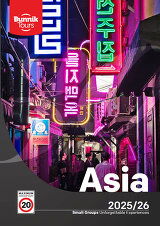
Bunnik Asia (2025-26)
Availability
A definite departure means minimum numbers have been reached for this departure to operate. Prices include air taxes and fuel surcharges, this amount is correct at time of brochure release and subject to change. Note air supplement may apply depending on airline availability and departure city. The majority of departures above will proceed or are guaranteed to depart (based on a minimum of 2 passengers). We will outline the status of your departure date in your quote along with all applicable discounts and specials.
Tour & cruises prices are per person. Prices shown have savings applied, are subject to availability and may be withdrawn at any time without notice. Pricing and trip details are correct at this point in time, however are subject to confirmation at the time of booking and are subject to change by Bunnik Tours. For cruise itineraries, cabin images are sourced from Bunnik Tours. These should be treated as indicative only. Cabin inclusions, upholsteries and room layout may differ to the image(s) shown depending on the ship selected and your sailing dates.
